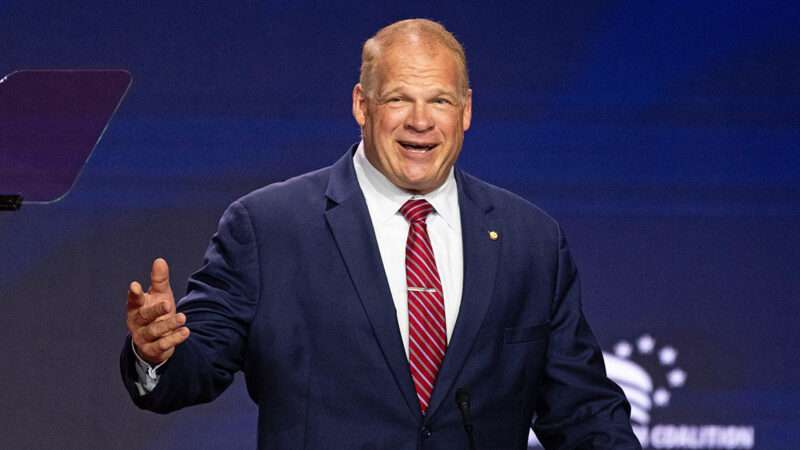
Glenn Jacobs, better known to wrestling fans as “Kane,” has spent the past seven years as the mayor of Knox County, Tennessee. While many politicians tend to become free spenders the longer they are in office, Jacobs remains a vocal advocate for limited government and fiscal restraint. At former Rep. Ron Paul’s 90th birthday celebration in August, he sat down with Reason‘s Nick Gillespie to discuss Paul’s enduring legacy, the rise (and fall?) of libertarian ideas within the GOP, President Donald Trump’s relationship with the administrative state, and how Jacobs has governed at the local level without raising taxes.
Q: How did Ron Paul’s message activate a movement, and you specifically?
A: It was tying the fiscal conservatism together with the noninterventionist foreign policy. A lot of Republicans, including myself, were wondering, “Why are we running around being the world’s policeman? It’s very expensive, and we lose American boys and girls in these foreign conflicts that we don’t belong in.” That’s where the mass appeal came from.
Then for someone like me who’s very interested in economics, [hearing him] talk about how the Federal Reserve and central banking is what fuels all of these wrong-headed policies. He was the actual anti-establishment candidate, and with the Bush administration, the GOP had taken a hard turn toward establishmentism. No longer the party of Reagan, but now, the big spending conservatives, big government conservatives.
Q: How does Trump stack up compared to somebody like President Ronald Reagan or Ron Paul?
A: I do think that he believes in what he’s trying to do. My hope with this administration, and you saw it at the start, is pushing back against the administrative state and the deep state.
I don’t think the average person understands that it’s not Congress or the president that are actually running things. It’s the administrative state and the bureaucrats who are actually populating the rules. They’re the ones running most of the government.
Q: Trump is spending tons of money—he doesn’t care about debt or deficit. Do you think he is going to dismantle the way government agencies can go after people for whatever reason they want, or is he part of the problem?
A: I think he is trying to dismantle that. You see it with, say, the IRS and some of the other agencies. They have made moves to limit their authority.
Q: A lot of people are worried about Immigration and Customs Enforcement going around masked, picking up people merely for speaking Spanish. Does this worry you?
A: It doesn’t. That’s why we have a legal system. People have been afforded due process, and so that’s not something that actually does worry me. I think the system is holding up, from what I’ve seen.
Q: You came into office saying you’re not going to raise taxes, you’re going to cut spending. Have you been keeping your word?
A: I have, as much as possible. We’re very subject to inflation, just like private sectors, just like families. We’ve seen growth in our budget in nominal terms, but in real dollars, it’s about what it was 10 years ago. We’ve seen a slight decrease in our indebtedness per person, and we have not raised property taxes. Just that alone is a challenge.
Q: You’ve said part of the Ron Paul legacy is that there’s more of a libertarian wing in the Republican Party. I’m not a Republican, but I am a libertarian. We had the Tea Party, and people like you started emerging, along with Sen. Rand Paul, Rep. Thomas Massie, and former Rep. Justin Amash. But when I look at the GOP now, especially at the national level, I see fewer libertarian ideas ascendant. I hear people wanting to cut free trade, close the borders, and throw more people in jail, even for nonviolent crimes. Where do you see the libertarian impulse in the Republican Party?
A: The folks you just mentioned came out of the Ron Paul revolution. All these ideas—not everyone’s going to embrace them 100 percent. But I think that when you look at the much stronger noninterventionist foreign policy, especially, those things are there and they were not there before.
This interview has been condensed and edited for style and clarity.
The post Glenn Jacobs on Donald Trump, the Administrative State, and Ron Paul’s Legacy appeared first on Reason.com.



